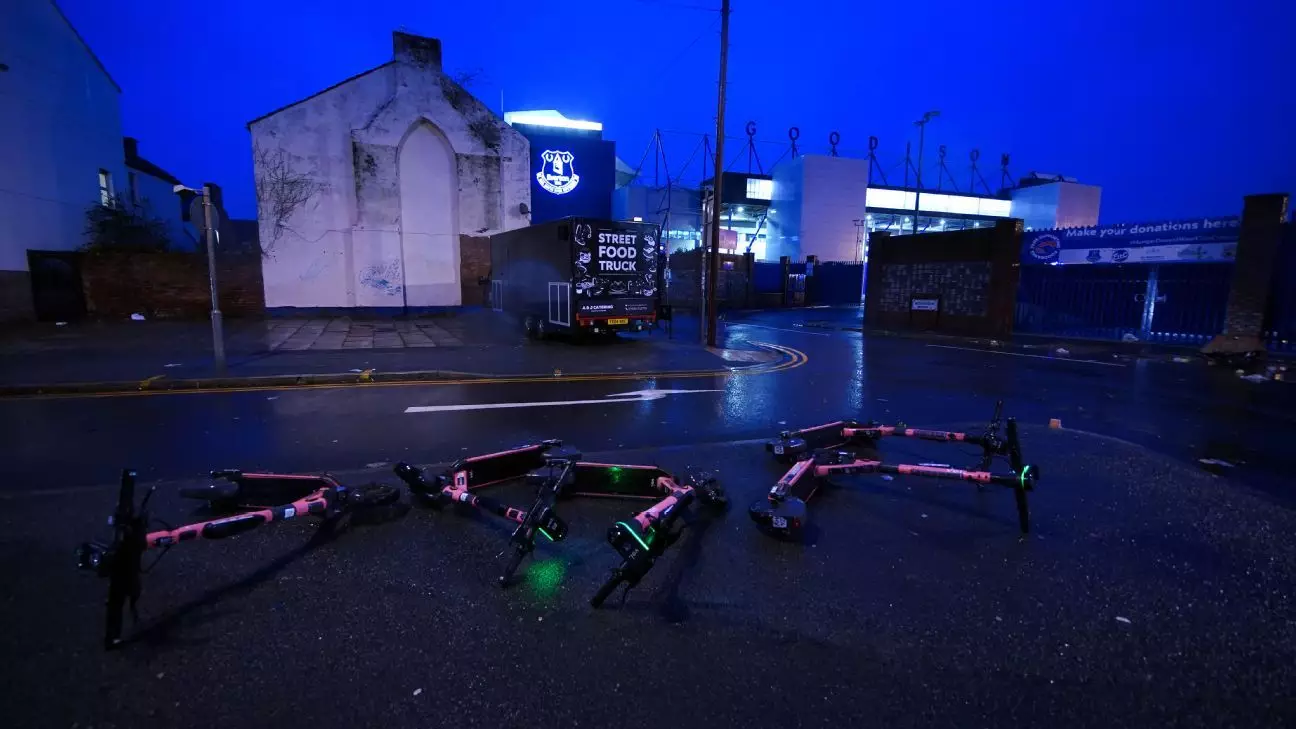In a surprising turn of events, the highly anticipated Merseyside derby between Liverpool and Everton, scheduled at Goodison Park, has been postponed due to exceptionally harsh weather conditions affecting the area. Originally set to start at 12:30 p.m. on Saturday, the match’s cancellation has sparked conversations around player and fan safety, emphasizing the growing impact of extreme weather on sporting events. As Storm Darragh lashed Merseyside with gusts of wind reaching up to 70 mph, local authorities collectively deemed it unsafe for supporters to travel to the stadium.
This postponement is significant, not just for the fans eager to witness this historic rivalry, but it also marks the final league meeting at Goodison Park before Everton relocates to their new stadium at Bramley-Moore Dock. The atmosphere leading up to the fixture was palpable, with tensions high between the teams and their followers. The decision to call off the event reflects a serious commitment from both clubs to prioritize safety over the excitement of the match itself.
The decision to delay the match was reached following extensive conversations among Liverpool, Everton, Merseyside Police, and Liverpool City Council. The Safety Advisory Group met early Saturday to assess the risks associated with the severe weather. Their findings underscored the implications of strong winds on the well-being of fans, staff, and players alike. As articulated in an official statement from Everton, the rationale behind the postponement was rooted in a clear understanding that safety must take precedence over sporting tradition. The foresight exhibited by the officials involved is commendable, considering the potential for injury or dangerous circumstances in adverse weather conditions.
This collaborative effort highlights the responsibility of clubs and local authorities in safeguarding those involved in football. The commitment to ensuring everyone’s safety demonstrates a progressive approach to managing unforeseen circumstances that could otherwise jeopardize the event.
Impact on the Premier League Landscape
Liverpool currently sits atop the Premier League table with a seven-point lead over their opponents; however, this lead could dwindle depending on the outcomes of other matches occurring that day, notably involving Chelsea and Arsenal. Followers of the league are aware of how a single game can shift dynamics, creating a scenario where Liverpool’s dominance may be challenged if other teams capture crucial points against their respective opponents.
While the postponement of the Merseyside derby is disappointing for fans anticipating an exhilarating match, it provides an opportunity for the teams to regroup and refocus their energies for the remainder of the season. It is estimated that the fixture will be rescheduled as a night game, thus allowing fans to accommodate their plans around the new date. The messaging from both clubs regarding ticket validity reassures supporters that their chance to witness the derby will not be lost.
The dialogue surrounding safety amid challenging weather conditions prompts a broader reflection on how sports organizations can evolve their protocols. Considering the increasing frequency of severe weather events globally, clubs may need to develop more comprehensive guidelines in collaboration with meteorological services to make informed decisions swiftly. Ensuring that fans receive timely communication during such instances will not only foster loyalty but also build trust between fans and club management.
With several other fixtures in the Premier League continuing as scheduled, clubs like Brentford and Crystal Palace have advised their fans to travel safely and account for delays due to the weather. The proactive messaging highlights the importance of preparation in light of unpredictable elements affecting sport.
As the storm is expected to ease, the focus shifts to how Premier League teams will re-align their schedules moving forward. The implications of these weather conditions extend beyond a single postponed match; they serve as a reminder of the delicate balance between sport and nature. For fans and players alike, the anticipation of rescheduling fosters a sense of resilience and adaptability within the football community. With safety at the forefront, the future of football remains bright, albeit it will require vigilance against challenges from the environment.


Leave a Reply